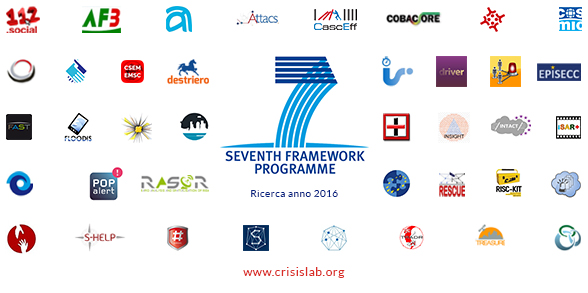EU FP7 and Horizon 2020 Framework
The role of Twitter in the shared knowledge of community research projects.
27 maggio 2016
Italian version
In 1984 development plans have been created with the aim to support European innovation and after quarter of a century EU ventures and investments have been developed every five years so that researchers’ funds have been increased considerably.
Horizon 2020, even if it is keeping the increased available budget – up to 80 billion euros – breaks up with the previous seven framework programmes. Priorities have been rethought, along with funds proposal, in order to make the projects sharper and to increase possible returns directly to the market, to the business development and to the social challenges of Europe.
The results achieved by these projects realised in collaboration with universities, companies and public organisations, are often vaguely perceived by European citizens who rarely are aware of the several initiatives organised by development plans.
From an historical perspective, projects pertinent to the development plan FP7 have been the first that took advantage of the Social Media potentiality to enlarge audience’s research.
Opening European researches’ experimentations to a wider community than stakeholders only allowed several consumers to understand and being involved in innovations developed by research groups in different fields.
Following these results, we decided to study the projects related to the development plan FP7 that used a Social Media account to spread content and resources related to risk communication and preparedness, disaster risk reduction and early warning systems.
Our research is focused on the Cooperation programme that is the kernel of the framework FP7 and is certainly the most wide part, implementing the research in collaboration with Europe and other countries on 10 thematic areas:
Health; Food, Agriculture and Fisheries, Biotechnology; ICT – Information & communication technologies; NMP – Nanosciences, nanotechnologies, materials; new production technologies; Energy; Environment (including Climate Change); Transport; SSH – Socio-economic Sciences and the Humanities; Space; Security.
The Security programme subsidised projects with the aim to define a general strategy about security focused on the following areas:
-
Citizen’s security, technological solutions for civil protection, bio-security, crime and terrorism protection;
-
Infrastructures and Public transports security
-
Borders security, communication, coordination in human operations and first aid
-
Security systems integration, collection of security info for civil security …
-
Security and society
From this assets have been developed several European research initiatives that shared experiences, studies and new technological applications via Social Media, Twitter in particular, all useful to develop combined strategies and know how for the growth of knowledge and capacity to answer to European communities disasters.
Which are the projects that interacted with consumers to better empower and build a community through researches able to expand the knowledge of the results?
Studying Twitter enables us to discover these accounts day by day, allowing us to build knowledge and relationships to share with the whole community of researchers.
More than 30 accounts oversee, at different levels, fields of studies similar to the security and civil protection, 17 of which related to the Cooperation plan FP7, that can be followed to discover each operation and results in the following accounts Twitter listed in an open and available list:
Projects are spreads all over the Europe with the participation of different research institutions, universities and companies from all the geographical areas of the continent. The following map shows the FP7 project region by region depends on the Project Coordinator location.
Italy’s position is relevant as Project Coordinator for five different projects, two related the Security field:
-
Destriero Project, that proposes to develop an evaluation tool for the reconstruction and the rescue after crisis by telerilevamento, main coordinator the company Finmeccanica E-geos SPA and partners CINI Consorzio Universitario Informatica e la Scar Srl
-
Super Project, coordinated by the company Vitrociset in collaboration with the institutional partner Dipartimento Regionale della Protezione Civile della Campania, that aims to develop a framework for the Sovial Media usage in emergency situation
Three more are:
-
Floodis coordinated by the stituto Superiore Mario Boella, Turin, for the development of an app able to inform in case of flood and based on an integration between emergency infrastructures and satellite information
-
Rasor coordinated by Fondazione CIMA, for the development of a platform able to analyse risks and to support the whole disaster cycthe le by monitoring infrastructures and evaluating the climatic changes impact
-
Sector coordinated by E-geos SPA, with the aim to improve the management of multi-actors crisis and emergency situations



